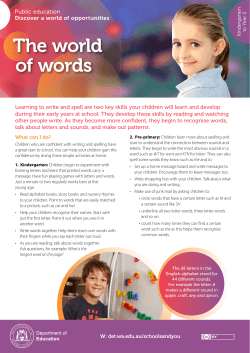
“expression of interest” for hosting marie s. curie fellows in spanish
Jo Ann D. LoRusso, Ph.D. jdlorusso06@yahoo.com 1 Reading to Infants Point to the pictures Name the pictures Talk about the pictures Talk to children throughout the day about the things you are doing and things that happen around you. Language development is vital to reading. 2 Photos, Mirrors on Walls and Floors What’s missing in this photo? What’s good about this photo? 3 Suggested Reading for Infants Touch & Feel Baby Animals by Baby Einstein Disney Book Group Pat the Bunny by Dorothy Kunhardt Baby Games Games to Play with Baby Action Rhymes My Face Book by Star Bright Books My First Baby Games by Public Domain and Jane Manning Signing Exact English – spiral 4 Get Ready to Read - 2 & 3 year-olds Read to the children every day. Encourage children to choose the books they want you to read. Point to pictures and name them out loud. Encourage children to point to pictures as you read. 5 2 & 3 year-olds Be patient when children want to read the same book over and over. Encourage children to “play” with books. Keep books accessible to children all day. Listen when children “pretend” to read. Create a comfy reading area with soft chairs and pillows. 6 2 & 3 year-olds Give children paper and crayons so they can scribble, draw, and pretend to write. Teach them how to write the letters. Sing the alphabet song so children can learn the names of the letters. Keep alphabet puzzles accessible and refer to them regularly. 7 Phonics vs. Phonemic Awareness Phonemic awareness is the awareness of sounds Phonics is the method of teaching beginning readers to connect the sounds of spoken language with letters or a group of letters Part of phonics instruction involves the teaching of children to blend the sounds of letters together to form words (technically referred to as decoding skills). Phonics instruction typically starts with letters first and children are taught the sounds that those letters "stand for" or "make". 8 Suggested Reading for Ages 2-3 We’re Going on a Bear Hunt by Michael Rosen Brown Bear, Brown Bear, What Do You See? by Bill Martin, Jr. Goodnight Moon by Margaret Rice Brown Where’s Spot? By Eric Hill What’s in my Pocket? By David Carter 9 Preschoolers Ages 3-5 Talk and Listen Talk about what you are doing together : eating, taking a walk, going on a field trip Take children to new places and talk about these new experiences 10 Ages 3-5 Teach About Print and Letters Help children learn to recognize their names in print. Point to letters and talk about the letter names and sounds (phonics). Point out words and letters everywhere you can. Teach children the meaning of new words. 11 Circle Time Schedule Creates left to read eye placement for early literacy. Tells children what is coming next. Relieves anxiety about how much longer circle time will be. 12 Circle Time What’s wrong with this photos? 13 Books in Every Center Home center Cook books Recipe cards Note pads for lists Science center Insects Plants Magnets Math center Counting Manipulative designs 14 Ages 3-5 Put magnetic letters on smooth, safe metal surfaces and refer them to often. Play games using the alphabet Bingo Find your name letters 15 Ages 3-5 Read Together Read predictable books Read books with rhymes Ask children what will happen next in the story Talk about the books Create a lending library for children to take books home 16 Writing Centers Share alphabet books with children Keep multiple types of paper accessible in the center Lined Unlined Construction Colored Keep multiple types of writing implements accessible Keep letter stencils in the center. 17 Reading Activities Create dramatic play areas based on reading Doctor’s office Post office Dentist office Chica Chica Boom Boom tree and letters Make hats to correspond with Caps for Sales 18 Suggested Reading for Ages 3-5 Harold and the Purple Crayon by Crockett Johnson Caps for Sale by Esphyr Slobodkina So Say the Little Monkeys by Nancy Van Laan The Napping House by Audrey Wood Chica Chica Boom Boom by Bill Martin Jr., John Archambault and Lois Ehlert 19 20
© Copyright 2025





















